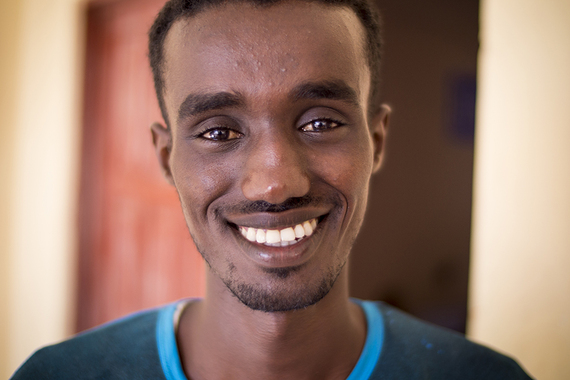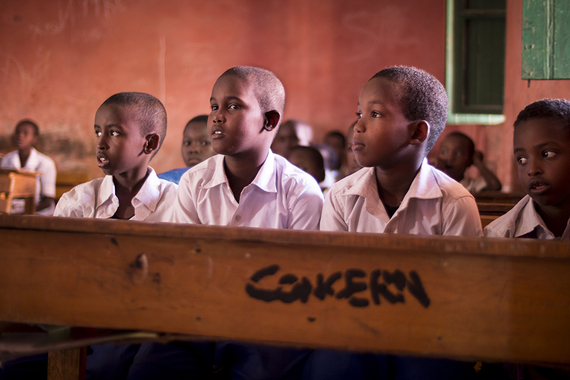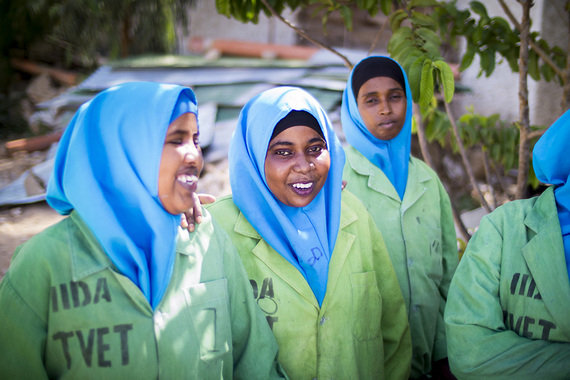
Jamel Egal was born the year it all fell apart.
1991. Somali President Siad Barre was overthrown and anarchy overtook the east African nation of Somalia. Warlords filled the void of a central government as lawlessness reigned and war became the norm.
Jamel was 8 when conflict descended on his family's home in Baidoa in south-central Somalia. "We lost everything -- our house, our cattle," he says.
Now 23 years old, Jamel is part of the generation of Somalis who know nothing but war. Yet the future of their battered country rests in their hands. Decades of conflict have robbed many of even a basic education, and few employment opportunities exist. With scarce alternatives, many young people fall into violence themselves.
This is something Jamel knows firsthand. "I know people who got involved [in the fighting], even some of my friends," Jamel says. He lifts up his pant leg to reveal a round scar, the remnant of a bullet wound from a shootout he got caught up in. He doesn't go in to details, but simply says, "I had no skills and was not able to manage my life."
Jamel is far from alone. According to a report from the United Nations Development Program (UNDP), only four of every 10 Somali children are in school, while 67 percent of young people ages 14 to 29 are unemployed.
"Our youth were destroyed because they didn't get opportunities and were given arms," says Nura, a mother who has three daughters attending a Jabuti Primary School in Mogadishu supported by the international humanitarian and development organization Concern Worldwide with funding from Irish Aid. "They destroyed themselves and other people. When kids are in school, they are protected from violence outside and have a future."
Today, Somalia is a country at a crossroads. Mogadishu is now relatively stable and under the control of the federal-government supported African Union forces. Recovery projects funded by the international community are underway in the beleaguered capital, but its roads are still ridden with potholes, its buildings pock-marked with bullet holes.
However, outside the capital, particularly in southern Somalia, war still rages on as the joint African forces, AMISOM, and Somali National Forces carry out an offensive against Al Shabaab.
With 70 percent of Somalia's population made up of young people under the age of 30, youth is not only critical for Somalia's future, but for the direction it takes today. Education and employment opportunities are paramount.
Yussaf, a parent of two children attending Jabuti School, believes that education brings opportunity and that a lack of opportunity is what tempts young people to partake in violence. "Those who don't get an opportunity to go to school join [an opposition group]... or end up in prison," he says bluntly.
This could have been the case for Jamel until, in 2012, he heard about an electrical course run by a non-governmental organization (NGO) and decided to apply. He was accepted and embarked on six months of electrical training at a school run by the Somali organization IIDA and Concern with funding from Irish Aid.
Today, Jamel is working for a company in Mogadishu as an electrician and lives with his wife, who is pregnant with their first child. "The course has enabled me to earn a living," the young electrician says. "For me and my family, it was like turning on a light."
It is that light -- the chance to provide for oneself and one's family and contribute positively to society -- that so many Somali young people lack. But as Jamel shows, an investment in their future can mean the difference between killing and living, despair and hope.
Go Ad-Free — And Protect The Free Press
Already contributed? Log in to hide these messages.
"Everyone wants to see the country change from negative to positive," says Jamel. "I will do everything I can to help. The key thing is for youth to engage in positive opportunities, like skills and education. Youth is the key."
Concern Worldwide is an international non-governmental organization dedicated to reducing extreme poverty through emergency response, recovery and development programs. For information, please visit concernusa.org or follow us on Twitter (@Concern).



